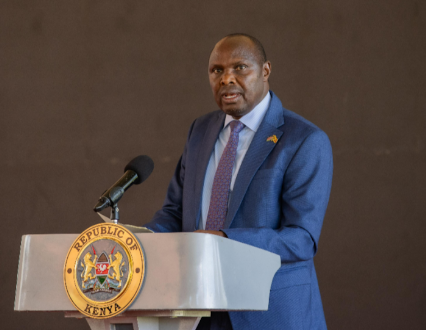To modernize Kenya’s public service, Chief of Staff and Head of Public Service Felix Koskei has launched two advanced digital systems: the Presidential Directives Management Information System (PDMIS) and the Foreign Travel Management Information System (FOTIMS). Implemented on August 1, these systems are anticipated to transform government operations by promoting transparency, accountability, and efficiency.
While President William Ruto issues directives and announcements during both formal and informal engagements, their execution has occasionally been inefficient, leading to delays and a lack of accountability.
In accordance with Article 135 of the Constitution, the Presidential Pronouncements & Presidential Policy Implementation unit receives these directives, converts them into formal documents, and distributes them to ministries and state departments for implementation, with oversight from Koskei’s office.
Presidential directives serve as a crucial governance tool, providing clear guidance on policy implementation and exercising the president’s executive authority to ensure that government actions align with national objectives.
They aim to foster coordination and uniformity across ministries and agencies, establish accountability, and facilitate swift responses during crises. Additionally, directives bridge legislation and practical governance, helping to manage public expectations by clearly communicating the government’s priorities and actions. Overall, they are vital for effective management and oversight within the Executive branch.
Historically, this process has been largely manual, plagued by common challenges such as delays, miscommunication, and potential loss or misplacement of documents. The introduction of the PDMIS will directly address these issues. By automating the issuance and tracking of presidential directives, it ensures that all directives are uniformly distributed and closely monitored for implementation.
Switching from hard copies to a centralized digital platform will not only reduce the risk of document loss or manipulation but also allow for real-time tracking of progress, thereby holding ministries and state departments accountable for timely execution.
Similarly, the FOTIMS will revolutionize the process of foreign travel clearances for senior government officials, tackling many long-standing issues within the system. Currently, foreign travel clearance for all Cabinet Secretaries, Principal Secretaries, chairpersons, and CEOs of State Corporations is obtained from the President through the Office of the Chief of Staff and Head of Public Service.
Historically, this process has been cumbersome, characterized by lengthy application procedures, long turnaround times, a complex approval process, and the frequent use of paper records—all of which are prone to loss or misplacement.
FOTIMS addresses these inefficiencies by digitizing the entire process, ensuring that applications and approvals are managed swiftly and transparently. This system not only streamlines operations but also enhances prudence and cost-effectiveness by reducing the reliance on paper records and minimizing delays that can incur unnecessary expenses.
Additionally, FOTIMS provides real-time information about the whereabouts of senior Executive officials at any given time, offering a level of oversight that was previously unattainable within the government. The system will also track the details of acting officers during periods when substantive officeholders are on foreign travel, ensuring continuity and accountability in government operations.
The implementation of these systems aligns with the government’s broader agenda of digital transformation. By embracing technology, Kenya is positioning itself as a leader in e-governance, ensuring that its public service is not only more efficient but also more responsive to the needs of its citizens.
Koskei, whose role includes supervising all Principal Secretaries, has been advocating for improved quality of services and government delivery. The transition to digital platforms reflects a commitment to reducing government expenditure, with the potential to save millions of shillings that would otherwise be spent on paper, printing, and physical storage.
These systems are not just about efficiency; they aim to instill a culture of transparency and accountability within the public service. By making information readily accessible and processes more transparent, these platforms empower both government officials and the public to hold one another accountable. This is a critical step in the fight against corruption, which has long hindered Kenya’s development.
Koskei has been pivotal in transforming Kenya’s Public Service through various strategic initiatives focused on enhancing transparency, accountability, and efficiency.
In addition to these technological advancements, he has been at the forefront of the fight against corruption within the public sector, leading a crackdown on graft, particularly in high-spending institutions and county governments. He has addressed issues such as nepotism, misuse of procurement processes, and inflated workforce numbers due to political interference.
Since taking office in 2022, Koskei has emphasized the need for public officials to adhere to ethical standards, warning that those found engaging in corrupt practices will be held personally accountable.
His efforts are part of a broader government strategy aimed at preventing corruption by limiting opportunities for unethical behavior, rather than relying solely on investigations and prosecutions, which have also faced challenges, with many misusing public resources.
President Ruto’s digital transformation agenda, spearheaded through the Bottom-up Economic Transformation Agenda, seeks to revolutionize the public service and economy by leveraging technology.



